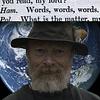You need to sign in or sign up before continuing.
Take a photo of a barcode or cover
My wife asked me to describe this book, and the best I could come up with was, "computational philosophy". It's not often you encounter a sci-fi book that seriously asks you to consider the nature of truth, reality, existence, consciousness, and the roots of physics, but this one does.
Strongly suggested if you like philosophy and smart sci-fi.
Strongly suggested if you like philosophy and smart sci-fi.
This was a book with interesting ideas on programming, identity, simulation, layers of abstraction, with layers of extrapolations. For programmers, I would recommend it because of some of the interesting ideas, although I don't think it was an amazingly well-written book. The ideas held my interest way more than the characters.
Copies running within different realities and interactions between copies and realities in this SF novel. Philosophical and technical implications were sometimes beyond me.
I think the concepts were too mind boggling for me to handle. I can usually handle a lot of boggling.
Lots of very prescient things in this book, but sci-fi is not my genre. I really didn't care if any of these people lived, died, were copied, or lived forever.
This is a tough book to evaluate. The characters are two dimensional exposition machines, the prose is largely utilitarian, and even the plot is pretty flimsy. Further, the conceit at the heart of the novel and the fulcrum for all of the action is a theory (the so-called "dust theory") that is ridiculous balderdash (and, if taken seriously, basically an excuse for moral heinousness).
However, the book is also an amazingly thoughtful rumination on the philosophical and psychological issues that would arise with translating our consciousness onto a computer substrate. Egan evaluates the challenges that would arise if you were able to copy yourself, personality, memories, and all, into a virtual world in a computer, and how that copy would interact with your original meat version, how the copy would adapt to the limits of its new environment, and what the legal and moral obligations would be in interacting with such copies. It's like a really interesting essay on the Singularity with a fine lace of silly plot frippery around the edges. Further, Egan was incredibly prescient on a number of points writing in the early to mid 90s (among other ideas, cloud computing, markets for computing cycles, etc.), and the book has aged pretty well. This is probably not my first choice for books about mind uploading, but it's a pretty interesting take and worth the read for anyone interested in the subject. Also, it totally affected my dreams the whole time I was reading it, which is always a good sign.
However, the book is also an amazingly thoughtful rumination on the philosophical and psychological issues that would arise with translating our consciousness onto a computer substrate. Egan evaluates the challenges that would arise if you were able to copy yourself, personality, memories, and all, into a virtual world in a computer, and how that copy would interact with your original meat version, how the copy would adapt to the limits of its new environment, and what the legal and moral obligations would be in interacting with such copies. It's like a really interesting essay on the Singularity with a fine lace of silly plot frippery around the edges. Further, Egan was incredibly prescient on a number of points writing in the early to mid 90s (among other ideas, cloud computing, markets for computing cycles, etc.), and the book has aged pretty well. This is probably not my first choice for books about mind uploading, but it's a pretty interesting take and worth the read for anyone interested in the subject. Also, it totally affected my dreams the whole time I was reading it, which is always a good sign.
If you've been looking for that novel that blends hard sf and cyberpunk, this is it. In other words, more cyber, less punk. The prolog is absolutely, brilliantly gripping. The first chapter will test your geekiness. I passed the test. I think.
This book was written in 1994. I read it in 2014. In some ways, it doesn't feel dated at all. For a tech-heavy book, that's impressive. There are no glaring technological misprognostications. Then again, the general interest in virtual reality seems very much a thing of the mid-90s. The zeitgeist seems to have shifted since then. In that sense, it is dated, but it's aged well.
In this imagined future, people are routinely scanned and simulated in virtual environments. The author does a great job of exploring some of the philosophical issues this premise raises. It's by no means exhaustive; it's more an exploration of questions than an attempt to provide answers, but that's a strength in my opinion.
What makes this so compelling is the way Egan manages to convey both the fascination and the horror of such developments in a believable way, sometimes in serial fashion, sometimes simultaneously.
This book was written in 1994. I read it in 2014. In some ways, it doesn't feel dated at all. For a tech-heavy book, that's impressive. There are no glaring technological misprognostications. Then again, the general interest in virtual reality seems very much a thing of the mid-90s. The zeitgeist seems to have shifted since then. In that sense, it is dated, but it's aged well.
In this imagined future, people are routinely scanned and simulated in virtual environments. The author does a great job of exploring some of the philosophical issues this premise raises. It's by no means exhaustive; it's more an exploration of questions than an attempt to provide answers, but that's a strength in my opinion.
What makes this so compelling is the way Egan manages to convey both the fascination and the horror of such developments in a believable way, sometimes in serial fashion, sometimes simultaneously.
Since every second Black Mirror episode is about simulating minds in some way and the recent hype around the simulation hypothesis, I was pretty sure that I was exposed to major ideas about the subject. Then I read this book and it expands this area of my mind by a factor of 100.
I even had the urge to go through all the books I've rated on goodreads.com so far and decrement their star ratings by one so that I can give this a 5 star and mean it.
I even had the urge to go through all the books I've rated on goodreads.com so far and decrement their star ratings by one so that I can give this a 5 star and mean it.
challenging
reflective
sad
medium-paced
Strong character development:
No
Loveable characters:
No
Diverse cast of characters:
No
Flaws of characters a main focus:
No
Another of Egan's philosophical fictions in the guise of science fiction. By setting the book in cyberspace where humans have uploaded themselves, he is able to discuss the possibilities when we are free of bodies and able to change ourselves.
Although I like his short stories better, because he is able to explore many different ideas in one book, he does manage to fit in quite a lot of thought-provoking notions as well as enough of a plot to prevent things getting too heavy.
Because people are able to change more readily, he is able to explore ranges of gender and culture fairly widely, though in this futuristic context I suspect that people who are LGBTQ+ in today's world may not feel adequately represented, though I can't be more sure than that.
Although I like his short stories better, because he is able to explore many different ideas in one book, he does manage to fit in quite a lot of thought-provoking notions as well as enough of a plot to prevent things getting too heavy.
Because people are able to change more readily, he is able to explore ranges of gender and culture fairly widely, though in this futuristic context I suspect that people who are LGBTQ+ in today's world may not feel adequately represented, though I can't be more sure than that.



